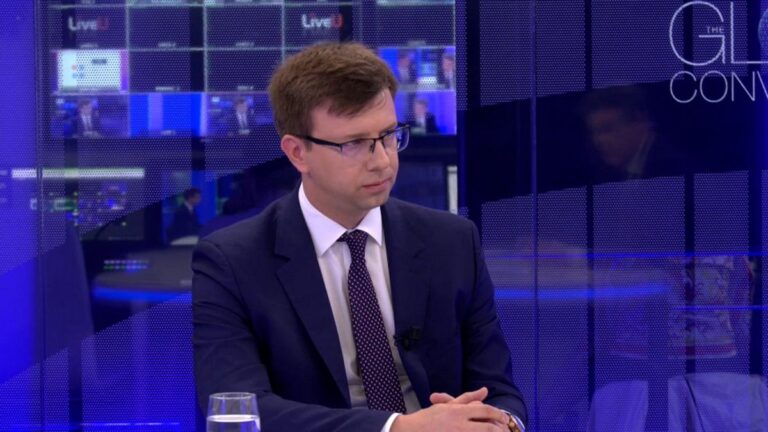Janos Boka told Euronews that Europe needed to maintain “some kind of relationship” with Moscow to protect itself.
advertisement
Hungary’s EU minister, Janos Boka, said in an interview with Euronews on Wednesday that the EU needed to work with Russia to build a “sustainable security architecture.”
“If we want to build a security architecture that is sustainable for the coming decades, we need to somehow tinker with Europe-Russia relations,” Boca said.
“We believe, like all EU member states, that we must fully support Ukraine’s sovereignty and territorial integrity,” he added. “This is beyond doubt. But we also believe that a sustainable security arrangement is impossible without negotiating with Russia through diplomatic channels.”
Last Friday, Hungarian Prime Minister Viktor Orbán made a surprise visit to Russian President Vladimir Putin in Moscow as part of “Peace Mission 3.0,” sparking backlash from EU leaders.
The meeting with Putin came after a visit to Ukraine for similar talks with President Volodymyr Zelensky.
The timing of the Moscow visit, just days after Budapest assumed the rotating presidency of the Council of the EU, and the use of EU presidency branding in communications about the so-called peace mission, angered Brussels.
European Council President Charles Michel responded sharply, saying that “the EU’s rotating presidency has no mandate to negotiate on behalf of the EU with Russia.”
This came just days before the attack on Kyiv’s largest children’s hospital, which a UN analysis said was carried out by a Russian missile, killed at least two people and injured around 50, including seven children.
Asked whether Hungary’s approach to Putin had been appropriate given the Kremlin’s simultaneous atrocities in Ukraine, Boka said: “The bombings are horrible, they’re terrible.”
“The lives lost and the damage caused in this war only highlight the importance of the Hungarian prime minister’s peace efforts,” he explained.
Prime Minister Orban “wanted to ceasefire”
In a letter to Michel and EU leaders seen by German news agency dpa, Orban justified his visit to Moscow because of the economic ripple effects it would have on the 27-nation bloc.
In the letter, Orban reportedly claimed that Putin expects a rapid collapse on the Ukrainian side in the coming months.
Boka told Euronews the Hungarian prime minister’s visit was designed to see whether both sides were willing to ceasefire and to assess how EU institutions could “help” mediate a solution to the conflict.
“Many member states believe that our strategic objectives can be achieved by military means on the battlefield. The prime minister’s intention was to provide additional information and clarification to inform those discussions,” Boka said, adding that Orban had privately briefed Michel and EU leaders on the results of his visit.
Zelensky has consistently maintained that Ukraine will not consider negotiating with Moscow until Russian troops withdraw from all of Ukraine, including Crimea.
The minister also described China as an important player in Hungary’s future peace talks, even though China has helped Russia circumvent Western sanctions by supplying banned parts to Russia’s military.
The EU has already imposed sanctions on Chinese companies for helping the Kremlin obtain deadly contraband.
Delay in European Parliament speech ‘just a matter of schedule’
Orban is ready to address the newly elected European Parliament to outline the priorities of the Hungarian government’s EU presidency, which runs under the slogan “Make Europe Great Again”, the minister said.
advertisement
It is customary for a newly appointed national leader to address the first plenary session after taking over, but Orban has not been invited to the inauguration ceremony planned for next week in Strasbourg.
Two sources familiar with the matter told Euronews that Orban’s speech to parliament was deliberately blocked by parliament amid discomfort over his visit to Russia and ongoing efforts to block EU aid to Kyiv.
But Boka dismissed suggestions that Orban’s exclusion was politically motivated, arguing that the fact that only one general assembly meeting will be held in July allows the prime minister to delay his speech.
“I don’t think there’s any political complexity here,” he explained. “It’s completely understandable that when the European Parliament is sitting at its first meeting and they’re deciding whether or not to elect the next president of the committee, they clearly don’t have time for this.”
“I think this is simply a matter of schedule. It is hard to imagine that the European Parliament is not interested in serious cooperation between its institutions during the Hungarian presidency.”
advertisement
The full interview will air soon on Euronews’ Global Conversation programme.

